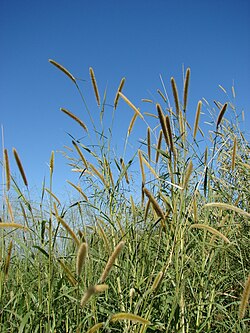Typical yield
80.0 t/ha
Varieties
1
Pest/Disease
1
Profile
- Growth habit
- perennial
- Lifecycle (days)
- 120-365+
- Primary uses
- Forage (cut-and-carry)
- Pollination
- wind
- Origin / distribution
- Africa; tropics
Environment
Climate
Temp optimal
20–30 °C
Rain optimal
1000–2000 mm/yr
Altitude
0–2000 m
Soil
pH optimal
5.5–6.8
Soil type
Fertile loams; tolerates many soils
Farmer Guide
Row spacing
100 cm
Plant spacing
50 cm
Depth
5 cm
Seed rate
kg/ha
Nursery days
Planting: Plant canes/splits; harvest every 6–8 weeks at 1–1.5 m height.
Nutrient Schedule
| # | Stage | DAP | Product | Rate | Targets (kg/ha) | Notes |
|---|---|---|---|---|---|---|
| 1 | Establishment | 0 | NPK 17-17-17 | 150 kg/ha | N: —, P₂O₅: —, K₂O: — | |
| 2 | After first cut | 60 | Urea | 100 kg/ha | N: —, P₂O₅: —, K₂O: — |
Nutrient Requirements
| Nutrient | Stage | Amount | Unit |
|---|---|---|---|
| N | Basal | 60 | kg/ha |
| P₂O₅ | Basal | 40 | kg/ha |
| K₂O | Basal | 60 | kg/ha |
| N | Topdress | 60 | kg/ha |
| K₂O | Topdress | 40 | kg/ha |
Images

| Name | Country | Maturity | Traits |
|---|---|---|---|
| Kakamega 1 | KE | 180 | High biomass; disease tolerant |
No fertilizer recommendations yet.
| Name | Type | Symptoms | Management |
|---|---|---|---|
| Napier stunt | disease | Stunting; yellowing | Rogue infected clumps; clean planting material |
| System | Typical | Min | Max | Notes |
|---|---|---|---|---|
| cut-and-carry | 80 | 40 | 120 | Fresh biomass/year |
No season calendars yet.
| Country | Region | Suitability |
|---|---|---|
| KE | Dairy belts | High |
